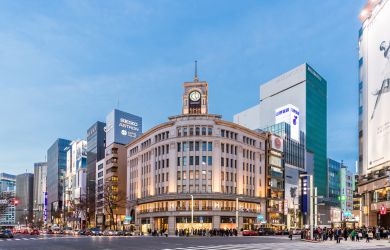
Originally published on metropolis.co.jp on March 2013

For the most part, the expat experience in Japan is a peaceful one. You quickly develop the necessary skills for life to pass harmoniously; namely selective hearing strong enough to drown out the existence of AKB48 and those instrumental versions of Western songs. As life settles into a steady routine of sorting your garbage into 17,000 categories, you can’t help but wonder if this sense of tranquility is born out of personal growth, or merely the 4m-wide gaijin berth afforded you in public at all times.
But this peaceful experience only lasts until you have visitors.
They arrive at Narita, negligent of the things you have come to treasure, unsure of what exactly has compelled them to fly thousands of miles across the globe to this unbearably hot/cold country. Armed solely with the knowledge of one thing, they march purposefully through the arrivals gate, a steely look on their faces, and without even uttering so much as a hello, look you directly in the eye and announce in a threatening tone the mantra: “I don’t like sushi.”
Presumably, the need to reaffirm this statement on an hourly basis is their protection against you, the crusader of sushi, clearly awaiting any opportunity to spring upon them and force this forsaken foodstuff down their unwilling throats. Which, despite the fact they’ve never actually tried it, absolutely cannot happen.
The time of the first feeding arrives, and with this crucial revulsion in mind, you order something you believe will ease them in to Japanese cuisine. They look down at their plates. Then back at you. And with an expression that suggests you have just offered them the head of their beloved childhood puppy on a plate, demand “What is this?” as you attempt to describe the concept of a hamburger without a bun.
Thereon your role as tour guide, translator, chauffeur and onigiri-unwrapping director commences. You carefully navigate them around those places you’ve visited one hundred times before and now steadfastly avoid in favor of not being crushed by hordes of stampeding tourists. Tokyo, Osaka, Kyoto, Hiroshima, you tick all the big ones off the list.
Yet, in place of the possible monetary reward you were anticipating for successfully commandeering a group of baboons outside the confines of their cages and around some of the finest natural and architectural sights the world has to offer, the primates instead turn their attention to loud, brash discussions of the following: the men carrying “light sabers” who direct traffic in and out of empty car parks, the use of surgical masks despite the lack of SARS, and the abomination of ATMs closing during prime drinking hours. These qualms are all voiced in your direction with a suspicious eye, as though by mere association with the country you are in some way responsible.
At the farewell dinner, as they paw at the condiments and complain about the lack of ketchup with which to drown out any essence of flavor from their fresh tuna sashimi, you politely inquire as to which part of the trip they will remember most fondly.
They gather together, making a series of disturbing noises from which you can only decipher the words “no fork” and “fish eyes,” and with the first real sign of apparent joy since their arrival, announce in unanimity: the clapping toilets at Narita airport. Which would be fine. Absolutely fine. It’s a unique part of Japanese culture, after all, not entirely unlike the bullet train—or geisha. Except it’s slightly less likely to draw thousands of people a year across the globe for a first-hand viewing.
It’s then, however, on day thirteen, that they decide to really batter home the fact they’ve utterly ignored all of your proffered wisdom by pulling out their as yet unopened copies of Lonely Planet Japan and asking, in all sincerity, “What is Shinjuku?” as something inside you quietly lays down and dies.
You remind them to fleece your apartment on their way out, lest they should leave you any sense of two weeks nenkyu well spent, and push them through the departure lounge where they knuckle-walk past the omiyage shop without even a backward glance, let alone the requisite 14 boxes of cookies and 30-minute queue.
And then a realization comes over you. The worst thing of all: that two, three, five or fifteen years ago… This was you.





